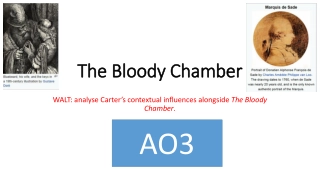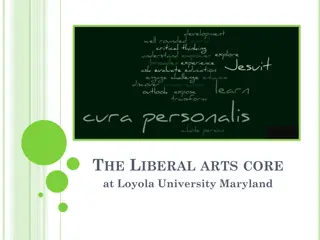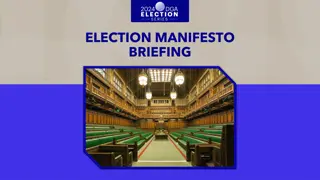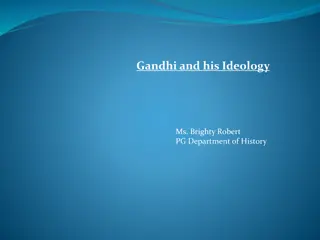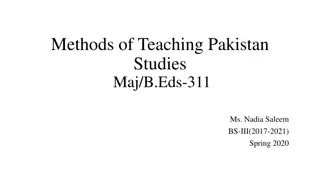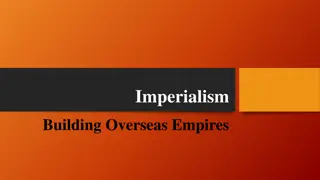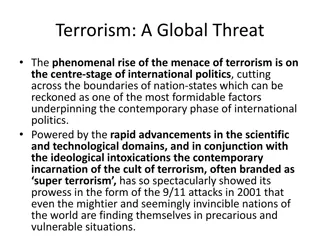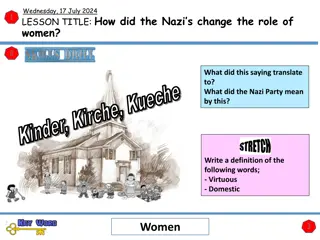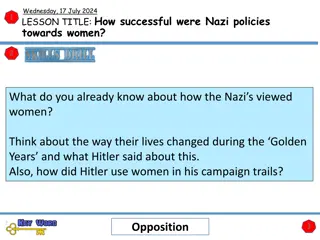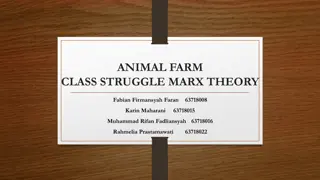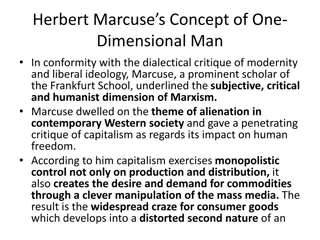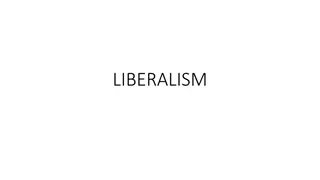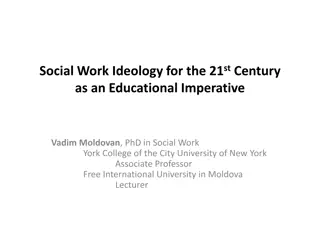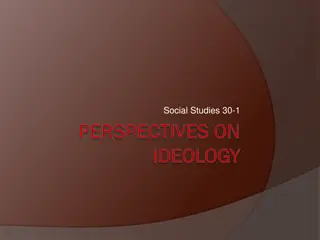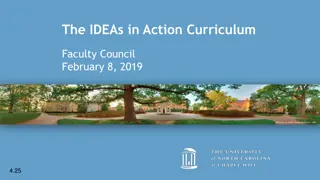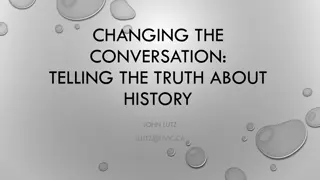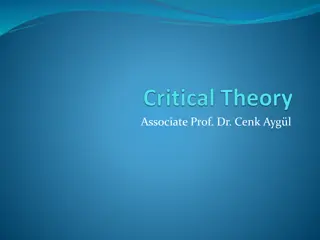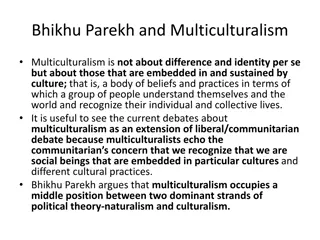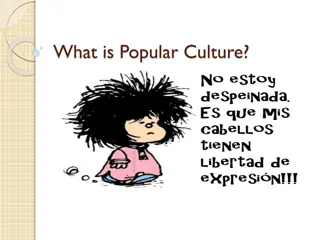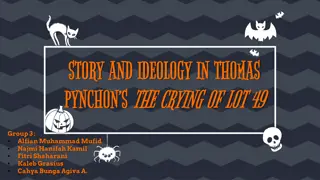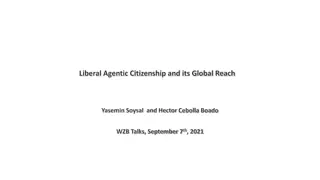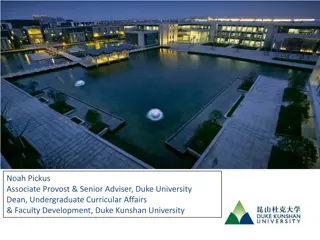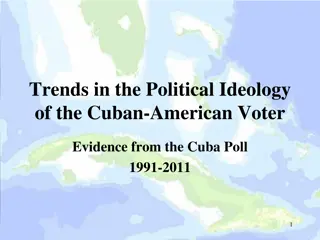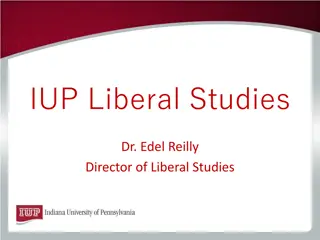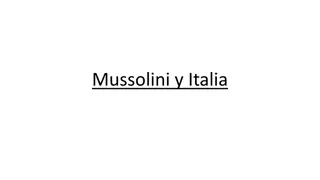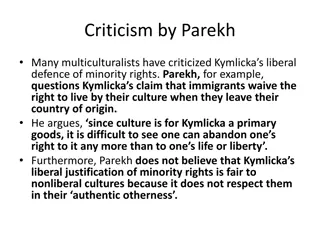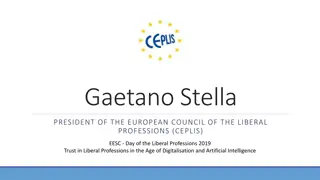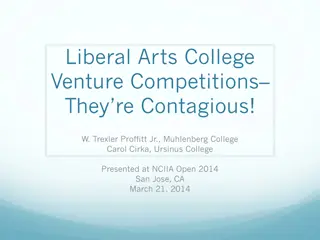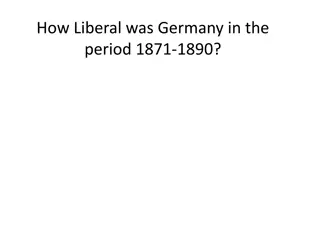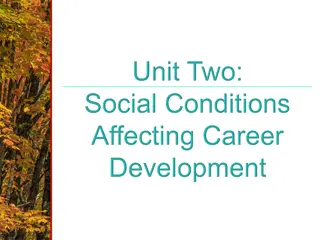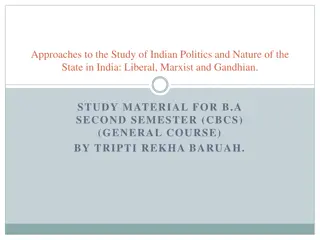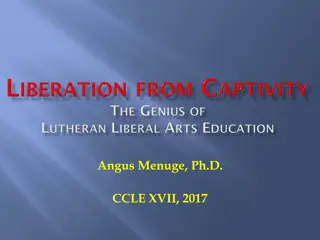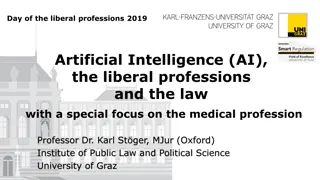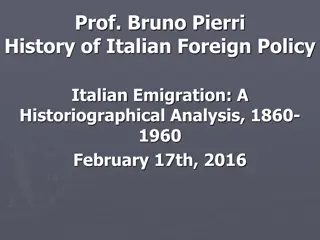Knowledge and Curriculum
Various forms of curriculum, the importance of curriculum, new trends in education, and the relationship between power and ideology in curriculum development. Understand the role of the state in curriculum development and the impact of meritocracy on the curriculum.
2 views • 16 slides
Angela Carter and Her Influential Works: A Contextual Analysis
Angela Carter, an English novelist known for her feminist and magical realism works, was influenced by her personal experiences and feminist ideologies. Her notable works include "The Bloody Chamber" and "The Sadeian Woman and the Ideology of Pornography". Carter's unique perspective on women's role
1 views • 26 slides
The Significance of Media in Language Learning
Media plays a crucial role in language learning by raising awareness of the ideology behind linguistic structures and providing valuable information on society and culture. Linguists are drawn to media language for research purposes and to understand its impact on language use and attitudes. Media s
12 views • 5 slides
Loyola University Maryland Liberal Arts Core Overview
The Liberal Arts Core at Loyola University Maryland emphasizes a well-rounded education through courses in Humanities, Social Sciences, Mathematical Sciences, and Natural Sciences. Students take 15 core courses in liberal arts, including writing, history, literature, language, philosophy, theology,
2 views • 19 slides
Election Manifesto Briefing: Key Takeaways on Tax, Finance, and Crime Policies
Labour, Liberal Democrats, and Conservatives present contrasting plans on tax, finance, and crime policies in their election manifestos. From scrapping business rates to increasing workers' rights and tackling crime, each party has distinct priorities and proposals. The Liberal Democrats focus on ta
0 views • 10 slides
Mahatma Gandhi and His Ideology in Indian History
Mahatma Gandhi, a pivotal figure in India's freedom struggle, advocated for non-violence, truth, and self-realization. He reshaped the Indian National Congress and empowered the masses to fight against injustice through civil disobedience. Gandhi's ideologies of swadeshi, local democracy, and truste
0 views • 28 slides
Objectives and Aims of Teaching Pakistan Studies in Education
Understanding the objectives and aims of teaching Pakistan Studies is essential for educators. Objectives serve as guiding points in the teaching-learning process, providing a framework for evaluation and development. On the other hand, aims are broader and philosophical, focusing on the purpose and
0 views • 48 slides
Understanding Religious Conflict: Definition and Types Explored
Religious conflict is a complex and recurring concept throughout history. Scholars have defined it as disagreements between religious groups. This conflict arises from contentious issues touching on ideology, morality, power, and identity, influenced by various socio-political, economic, and cultura
1 views • 13 slides
European Imperialism in the Late 19th Century
European nations in the late 1800s pursued imperialism to expand their empires for economic, political, and social reasons. Motives included economic interests, political and military ambitions, and the ideology of Social Darwinism. The Industrial Revolution fueled the need for resources and markets
1 views • 14 slides
Terrorism: A Global Threat in International Politics
The rise of terrorism as a global menace is a significant factor in contemporary international politics. Fueled by advancements in technology and ideology, terrorism poses a formidable challenge, exemplified by events like the 9/11 attacks. Efforts are needed to combat terrorism on both national and
0 views • 24 slides
Women's Role in Nazi Germany: Impact and Ideology
Explore how the Nazis shaped the role of women through policies and propaganda, emphasizing domesticity and motherhood. Analyze key figures like Joseph Goebbels and Hitler's perspectives on women's place in society. Understand the contrast between women's lives in Weimar and Nazi Germany.
0 views • 18 slides
Nazi Policies Towards Women: A Critical Analysis
Nazi policies towards women aimed to control and manipulate their roles in society, focusing on reducing women in the workforce, promoting Aryan reproduction, emphasizing purity and health, and encouraging Aryan marriage. These policies restricted women's freedoms and autonomy, enforcing strict guid
0 views • 11 slides
Understanding Class Struggle in Animal Farm through Marxist Ideology
Animal Farm, written by George Orwell, explores the concept of class struggle through the lens of Marxist ideology. The novel depicts the conflict between the bourgeoisie, represented by characters like Mr. Jones, and the proletariat, symbolized by the other animals on the farm. Through the story of
0 views • 12 slides
Critiques of Modernity and Liberal Ideology: Marcuse and Habermas
Herbert Marcuse's concept of One-Dimensional Man critiques capitalism's impact on human freedom and alienation in Western society. Marcuse emphasizes awakening individuals to their alienation to ignite their urge for freedom. Jurgen Habermas, in contrast, focuses on rational critique rooted in human
1 views • 5 slides
Understanding Liberalism: Key Ideas and Historical Context
Liberalism, a prominent political ideology, emerged in the 19th century and is closely linked to capitalism. It stands against absolutism and feudal privileges, advocating for individualism, freedom, reason, equality, toleration, consent, and constitutionalism. The evolution of liberalism emphasized
1 views • 18 slides
Evolution of Citizenship in Liberal Democracy
Citizenship within liberal democracy entails equal rights, duties, liberties, and constraints for individuals within a political community. The entrenchment of civil and political rights has shaped the struggle for membership and participation in political communities. Civil rights, essential for in
1 views • 11 slides
Social Work Ideology for the 21st Century: Educational Imperative
Social work education must adapt to current global challenges by reexamining ethical principles in light of perpetual warfare, fake news, and economic globalization. This paper discusses the relevance of social values in a changing world and proposes pedagogies for promoting a modern social work ide
0 views • 14 slides
Evolution of Liberal Citizenship Theory
The liberal theory of citizenship emphasizes the essential components of right, responsibility, and identity within a political community. It contrasts with pre-capitalist societies by offering a weak sense of membership and reduced citizen obligations. The addition of social rights has brought an e
0 views • 15 slides
Understanding Ideology and Society: Perspectives and Beliefs
Explore the significance of ideology in shaping societal perspectives, beliefs, and values. Understand the impact of ideologies on laws, societal structures, and individual behavior. Delve into concepts such as liberalism, individualism, and collectivism to gain insights into human societies through
4 views • 26 slides
Enhancing Education Through Liberal Arts Foundations and Student Engagement
Explore the intersection of liberal arts foundations with the goals of general education, focusing on ways of thinking and capacities essential for student success. Dive into research on student learning and feedback to optimize curriculum design for global engagement and scientific exploration. Emb
2 views • 19 slides
The Value of Liberal Arts Education in Today's Job Market
Parents and students are encouraged to consider the benefits of a liberal arts education, as it equips students with essential skills demanded in the current and future job market. Employers value soft skills developed through liberal arts studies, such as critical thinking, communication, and probl
0 views • 20 slides
Understanding Critical Theory in International Relations: A Deep Dive
Critical theory in IR since the mid-1980s challenges traditional views by emphasizing culture, ideology, and societal structures over objective truths. This approach questions the relationship between theory and practice, highlighting issues of inequality beyond just class, including race, ethnicity
0 views • 9 slides
Challenges of Multiculturalism in Liberal Political Theory
Bhikhu Parekh discusses multiculturalism as a middle ground between naturalism and culturalism in political theory. He highlights the importance of cultural plurality in contemporary liberalism, critiquing the assimilationist approach. He addresses the challenges multiculturalism poses for liberals,
0 views • 9 slides
Understanding Popular Culture and Ideology
Popular culture encompasses the lived practices and artistic products of society, contrasting with high culture. Various definitions highlight its appeal to a wide audience and its distinction from high culture. The relationship between popular culture and ideology is explored through practices that
0 views • 15 slides
Liberal Democracy and Citizenship: Rights, Duties, and Participation
Citizenship in liberal democracies entails equal rights, duties, liberties, and constraints, with a focus on civil and political rights. The entrenchment of these rights has been key in establishing popular sovereignty and individual autonomy. Civil rights, developed in the 18th century, centered on
2 views • 16 slides
Analysis of Ideology in Thomas Pynchon's "The Crying of Lot 49
This analysis delves into the story and ideology in Thomas Pynchon's novel "The Crying of Lot 49". The plot follows Oedipa Maas as she investigates the mystery of Tristero, a secret postal service. Set in California during the 1960s, the novel reflects the societal context of America during the Cold
0 views • 15 slides
The Global Spread of Liberal Agentic Citizenship
Exploring the diffusion and impact of liberal, agentic citizenship on individuals within a globalized knowledge society. The rise of agentic individuals empowered to participate at local, national, and transnational levels, alongside the challenges and inequalities associated with this model. Analyz
0 views • 15 slides
Duke Kunshan University - Transformative Liberal Arts Education in China
Duke Kunshan University offers a unique liberal arts education experience with a focus on globalism, shared principles, and key structural features. With a close faculty-student connection, it aims to cultivate informed and engaged citizens while providing opportunities for innovative learning. The
0 views • 14 slides
Changing Trends in Cuban-American Voter Ideology
Explore the evolving political ideology of Cuban-American voters from 1991 to 2011 through data on migration, residency, naturalization, and political exceptionalism. Uncover how these trends have influenced Miami's Latino demographics and the Cuban perspective on US/Cuba relations.
0 views • 24 slides
Unveiling the Benefits of Liberal Studies at IUP
Discover the essence of Liberal Studies at Indiana University of Pennsylvania (IUP) through a comprehensive overview of the curriculum structure, learning objectives, and the impact it has on shaping students into well-rounded individuals equipped with essential skills for personal and professional
0 views • 22 slides
Rise of Mussolini in Italy and Weaknesses of the Liberal Monarchy
The historical timeline of Italy before 1919 led to Mussolini's rise to power through various events such as his involvement with the Italian Socialist Party and the formation of the Fascio di Combattimento. Italy's Liberal Monarchy faced weaknesses, including political divisions between progressive
0 views • 35 slides
Critiques of Multiculturalism by Parekh, Taylor, Barry, and Kymlicka
Many multiculturalists criticize Kymlicka's liberal defense of minority rights, questioning his views on immigrants and children of parents who emigrate. Parekh and Taylor argue against Kymlicka's approach to culture and minority rights, while Barry criticizes how multiculturalists use culture to de
0 views • 7 slides
Advancing Liberal Professions in the Digital Era: Insights from CEPLIS President Gaetano Stella
Gaetano Stella, the President of the European Council of the Liberal Professions (CEPLIS), emphasizes the impact of digitalization on liberal professions, focusing on human rights protection, trust, and the need for AI development. The digital revolution has led to changes in organizational structur
0 views • 12 slides
Exploring the Intersection of Liberal Arts and Business Education
This content delves into the fusion of liberal arts and business education, emphasizing the importance of blending diverse fields for holistic development. It discusses the rising trend of venture competitions in liberal arts colleges, challenges faced in integrating entrepreneurship into traditiona
0 views • 14 slides
Germany's Liberalism Debate 1871-1890
Germany in the period 1871-1890 experienced a blend of liberal and conservative elements, with a prevailing conservatism. The debate centers on whether this period marked a shift from a predominantly liberal to a predominantly conservative state, despite the presence of democratic politicians and ob
0 views • 48 slides
Exploring the Role of Liberal Studies in Career Planning
Delve into how liberal studies courses can enhance career planning by providing a broader perspective on societal values, workplace diversity, and economic changes. Employers seek individuals with cultural competence and the ability to build professional relationships. This information can sharpen c
0 views • 12 slides
Approaches to Study of Indian Politics: Liberal, Marxist, and Gandhian Perspectives
Political Science encompasses various approaches such as Liberal, Marxist, and Gandhian for studying Indian politics. Scholars have explored the nature of the Indian state post-independence, focusing on democratization, social heterogeneity, and class dynamics. The Marxist approach views the state a
0 views • 14 slides
Philosophy of Liberal Arts Education and Freedom
Classical education programs at CUW emphasize a philosophy major with a focus on primary sources, history of philosophy, worldviews, bioethics, and apologetics. This education model seeks to equip individuals for freedom, drawing on the roots of liberal education in the concept of liberty as a means
0 views • 47 slides
The Impact of Artificial Intelligence on Liberal Professions in 2019
Discussing the influence of Artificial Intelligence (AI) on liberal professions, with a special emphasis on the medical field, as presented by Professor Dr. Karl St. ger. Exploring the definition of liberal professions, McCarthy's views on intelligence simulation by machines, the core aspects of Mac
0 views • 18 slides
Italian Emigration: A Historical Analysis, 1860-1961
Italian emigration from 1860 to 1961 was a significant phenomenon with millions of Italians permanently relocating abroad. The emigration process saw notable shifts in patterns and destinations over the years, reflecting underlying socio-economic factors and governmental approaches. Despite the libe
0 views • 39 slides

